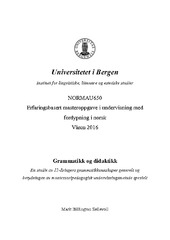Grammatikk og didaktikk. En studie av 12-åringers grammatikkunnskaper generelt og betydningen av montessoripedagogisk undervisningsmetode spesielt
Master thesis
Permanent lenke
https://hdl.handle.net/1956/12063Utgivelsesdato
2016-05-17Metadata
Vis full innførselSamlinger
Sammendrag
Sammendrag Tema for denne masteroppgaven er grammatikkunnskaper og grammatikkundervisning i grunnskolen. Jeg har gjennomført en undersøkelse blant et utvalg norske 12-åringer for å studere om grammatikkunnskapene deres er i tråd med det som forventes i læreplanen. Dette fagområdet har røtter tilbake til det 19. århundre, og har vært diskutert siden, tidvis ganske heftig til og med. Grammatikken i morsmålsundervisningen har holdt stand, med varierende argumentasjon for nytteverdien hele veien. Den siste tiden har det mest fremtredende argumentet vært metaspråkargumentet. Min erfaring er, at det virker som mange elever i dag mangler de grunnleggende kunnskapene de trenger for å bruke grammatikken som et metaspråk i sin skriveutvikling. Det er bakgrunnen for mitt valg av prosjekt. Siden grammatikkdebatten i stor grad handler om didaktikken i grammatikken, har jeg også undersøkt om det er forskjeller i grammatikkunnskapene til elever med ulik pedagogisk bakgrunn. Det har de siste årene vært en kraftig økning i framveksten av montessoriskoler i hele landet, og siden disse skolene representerer en alternativ pedagogikk, har jeg valgt å sammenligne elever med og uten montessoripedagogisk bakgrunn. Informantene i mitt prosjekt representerer et større geografisk område på Øst- og Vestlandet. Jeg utarbeidet et hefte med oppgaver i emnene ordklasser, setningsanalyse og kreativ skriving, som informantene løste individuelt. Mine hovedfunn, med besvarelsene på oppgavene som datakilde, er en stor andel av informantene har ikke kunnskaper om setningsanalyse det er en svak sammenheng mellom mestring av ordklasser, setningsanalyse og skriveferdigheter det er ikke noen signifikant forskjell mellom elever med og uten montessoripedagogisk bakgrunn informantene på Vestlandet har signifikant bedre resultater på alle deler av undersøkelsen enn informantene fra Østlandet Årsakene til disse resultatene kan være mange. På bakgrunn av teori og empiri diskuterer jeg om det negative synet på grammatikkundervisning kan ha fått følger for lærernes motivasjon for å undervise i emnet, eller om setningsanalyse er for abstrakt på et såpass lavt klassetrinn. Videre diskuterer jeg om den manglende forskjellen på informanter med og uten montessoripedagogisk bakgrunn kan forklares med testmetoden, mangel på faktiske forskjeller i undervisningsmetodene eller elevgrunnlaget. Tilslutt ser jeg på om mulige årsaker til geografiske forskjeller kan være sosiokulturelle forhold, tospråklighet eller nylig gjennomgang av emnet. Summary This master thesis study Norwegian pupil´s knowledge of grammar, grammar as a subject, and grammar teaching methods at the elementary school level. Data was collected through a grammar test designed for this study on a sample of 110 12-year-old pupils. The study investigates if their knowledge of grammar meets the requirements of the national curriculum, if knowledge of grammar is related to the pupil´s written language abilities, and and if different teaching methods influence on the pupil´s knowledge of grammar. The professional discussion in Norway on what role grammar should play in language education, originates from early 19th century, and it´s purpose has been discussed ever since. The arguments for upholding it as a key element in the language curriculum, and the discussions about the value of learning grammar has changed over the years. Lately, the most used argument is to establish a metalanguage. My experience is that most pupils today have insufficient basic knowledge of grammar, and they have limited ability to exploit a language of grammar to learn about their own writing and to talk about different texts and genres. This is the background for my choice to study pupils knowledge of grammar in my project. In addition to the question of why we need grammar skills, the discussion on grammar as a subject also consider methods and how to teach grammar, and I decided to compare pupils with different pedagogical background. There has been a great increase of new Montessori schools in Norway over the last 5- 10 years, and this trend continues as local public schools gets shut down. The Montessori pedagogy represents an alternative to the public school system, and I have chosen to compare pupils with a background in Montessori schools with those without. My participants are sampled from a geographically area mainly in the South-East and South-West of Norway. I have designed a grammar test to measure the participants skills in parts-of- speech, analysing sentences and writing skills. The participants worked individually when conducting the test. My main findings are: Most of the participants have just some or none skills in analysing sentences It is a weak correlation between grammar skills and writing skills There is no significant difference between the two groups of participants The results from the participants located in the west of Norway are significant better than the results from the rest of the participants. Explanations for these findings can be several. Based on theory and my findings I discuss if the negative focus on grammar as a subject has made teachers perceive grammar as not important, or maybe analysing sentences is to abstract for a 10-12-year- old. I also discuss why there´s no difference between the two groups of participants (with and without Montessori pedagogical background); reasons can be the test method, no practical difference between the use of pedagogical teaching methods, or insufficient methods of sampling participants. Finally I discuss different explanations for the significant difference in results between the different regions.
